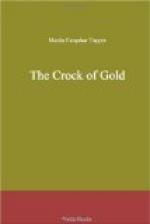at once, to save one’s self a vast deal of unnecessary
trouble. And, for mere tale-telling, this may
be sufficient. What need to burden memory with
imaginary statements, or to weary out one’s
sympathies on trite fictitious woes?—come
to the catastrophe at once: the uncle hanged;
the heir righted; the heroine, an orange-flowered
bride; and the white-headed grandmother, after all
her wrongs, winding up the story with a prudent moral.
Now, this may all be very well with histories that
merely carry a sting in the tail, whose moral is the
warning of the rattlesnake, and whose hot-exciting
interest is posted with the scorpion’s venom.
They are the Dragon of Wantley, with one caudal point—a
barbed termination: we, like Moore of Moore Hall,
all point, covered with spikes: every where we
boast ourselves an ethical hedge-hog, all-over-armed
with keen morals—a Rumour painted full
of tongues, echoing all around with revealing of secrets.
The feelings of our humble hero, altered Roger Acton,
are worthy to be studied by the great, to be sifted
by the rich; and Grace’s simple tongue may teach
the sage, for its wisdom cometh from above; and Jonathan,
for all his shoulder-knot and smart cockade, is worthy
to give lessons to his master: that master, also,
is far better than you think him; and poor Burke too,
for true humanity’s sake: so we get a mint
of morals, set aside the story. It is not raw
material, but the workmanship, that gives its value
to the flowered damask; our grand-dames’ sumptuous
taffeties and stand-alone brocades are but spun silk-worms’
interiors; the fairest statue is intrinsically but
a mass of clumsy stone, until, indeed, the sculptor
has rough-hewn it, and shaped it, and chiselled it,
and finished all the touches with sand-paper.
This story of ‘
The Crock of Gold’
purports to be a Dutch picture, as becometh boors,
their huts, their short and simple annals; so that,
after its moralities, the mass of minute detail is
the only thing that gives it any value.
Now, whilst all of you have been yawning through these
egotistic phrases, Roger has been digging in his garden;
there he is, pecking away at what once was the celery-bed,
but now are fallow trenches; celery, as we all know,
is a water-loving plant, doing best in marshy-land,
so no wonder the trenches open on the sedge, and the
muddy shallow opposite Pike Island puddles up to them.
There needs be no suspense, no mystery at all; Roger’s
dream had clearly sent him thither, for he should not
have levelled those trenches yet awhile, it was a little
too soon—bad husbandry; and, barring the
appearance of a devil, Roger’s dream came true.
Yes, under the roots of a clump of bullrush, he lifted
out with his spade—a pot of Narbonne honey!




